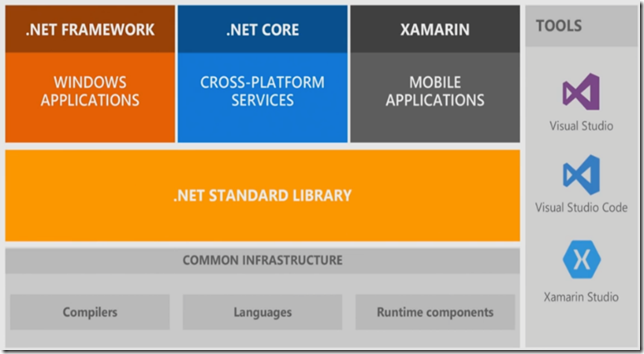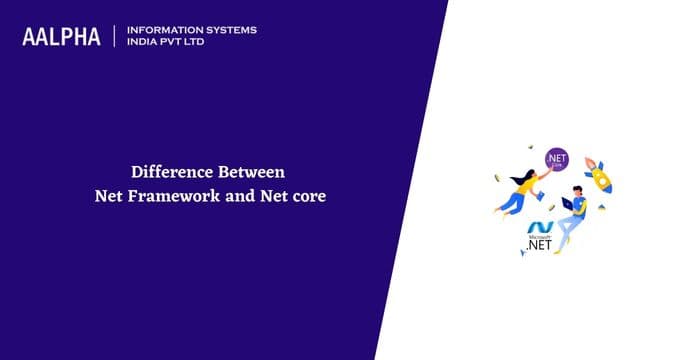Developers and programmers can use a single platform to integrate several programming languages, thanks to a unified software framework known as .NET introduced by Microsoft. The technological advancement has made work easier for developers and programmers in an organization, especially the ones connected to the server apps. The two, .NET Core and .NET Framework, are terms that can be unified to fall under a single name .NET. But there is some bit of Difference that arises when you happen to think of .NET Core and .NET framework. With .NET Framework being the initial aged traditional version, its counterpart .Net Core entails several improved services to address shortcomings within the previous version. As a result, the Framework has adhered to technological advancements and has improved the technical field to a greater extend. However, with all the progress .NET Core has brought, the .NET Framework remains to retain several techy lovers who have a passion for it.

The two common frameworks are mostly running the application development field, .NET and .Net Core, as per a survey done by StackOverflow. It is through this that you gain assurance of a proper business application.
Commonly used frameworks according to Stack Overflow
The tech field has seen lots of techy lovers and gigs struggle to identify the best between .NET Core and .NET Framework. With many people expecting the best in 2025, everything is likely to change with the introduction of .NET 5. That’s just but a bit of it, let’s wait even more.
Understanding the .NET family
Wondering what .NET means? Worry not. We’ll guide you through. The so-called .NET family is just but a free, open-source platform for developers, and it’s under the ownership of Microsoft. The platform is usually used for developing server-side applications.
Furthermore, the platform supports a good number of languages such as C#, F#, or Visual Basic. Additionally, apps supported on this platform include editors, libraries, IoT desktop, gaming, and desktop. We can now get to understand the advantages that come with the use of it. Server-side applications can be built by to implementations supported by this platform, and that is the .NET Framework, which has been in existence for some period and .NET Core, which has come up with improved features and services.
Let’s now get to understand a picture of .NET and .NET core frameworks.
-
The .NET Framework
Microsoft began by introducing this software. The .NET Framework was developed to authenticate with Windows operating systems only. With the software, you can develop and run other software applications of your own. It is efficient, and its source code can be acquired anytime. The con that comes with the use of this software is that it doesn’t support active contribution from the community of developers.
-
.NET Core
.NET Core is the advanced version in the .NET domain. The purpose was to identify issues that arose with the use of the .NET Framework. It was built to address some of the downfalls in the previous Framework, which is .NET Core. So, .NET Core is an app development framework that works perfectly well on a range of platforms and can be supported in various operating systems such as Linux, Mac OS, and Linux. Since it was made to address limitations brought about by the previous versions, it supports contribution from the developer’s community.
Both frameworks allow sharing code and several components if there is a need to do so. With both of them playing almost similar roles, several distinctions can be made from the two frameworks. Therefore, before you handle your next project in hand, consider the following differences that arise from both frameworks.
.Net Core and .Net Framework – Difference
Some of the critical parameters that draw a line of distinction between .NET Core and .NET Framework are discussed below:
Compatibility in .NET Framework and .NET Core
Compatibility is a critical factor that places .NET Core at its current position when compared to its counterpart. .NET Core can be supported by a range of operating systems such as Linux, Mac OS, and of course, Windows. The re-architecting of the structure of NET to come up with .NET Core was geared towards enhancing the development of various business applications on almost all platforms. When it comes to the web development sector, .NET Core proves to be flexible and efficient as well hence its popularity.
When it comes to the .NET Framework, some incompatibility properties can be pointed out. Since the Framework is restrictive, it cannot support flexibility. The only beneficiaries of this Framework are users of the Windows operating system. What is meant here is that other operating systems cannot support the Framework unless otherwise.
Performance in .NET Core and .NET Framework
Several features have been improved with the rise of newer versions of .NET Core. Applications are now being unique and enhanced courtesy of these modern versions. The performance provided by .NET Core proves the significant advancement made through its birth in the .NET family. It is substantially better in performance compared to its initial counterpart. However, smaller issues in production have been registered for .NET Core versions such as .NET Core 3.1. Developers, through the GitHub performance test, discovered that the .NET Core application used about two to three times the CPU time. In comparison with the .NET Framework, the .NET Core application works 20% less than the effectiveness of its counterpart.
Deployment model in .NET Framework and .NET Core
The flexibility in .NET Core’s deployment model is a thing to be considered. Therefore, with .NET Core, newer versions can be launched with instant updating on one machine at the time. The outcome is that the application in existence can’t be affected as the new one gets uploaded in new directories. With the integration of new enhanced tools, .NET Core can be efficient for applications that require separation from other files or applications.
With the .NET Framework, we need to realize that deployment of web applications can be done only on the Internet Information Server. This seems a downfall, right? It is, therefore, notably true that .NET Core is advantageous as it allows multiple ways of hosting hence making it more flexible compared to its counterpart.
Choosing between .NET Core and .NET framework
An institution that has adopted the use of .NET Framework may not have the pressure to explore its updated counterpart. But the big question is, “Should I go for .NET Core or .NET framework?” If you are deep into web development services, web applications, or mobile applications, then you automatically have to determine a framework of your choice wisely. Different personalities have different perceptions of these frameworks basing on their advantages and disadvantages.
.NET Core is essential and will help you in various ways. Consider a case where your project requires integration from platform to platform. Of course, the .NET Framework won’t help much as there are flexibility issues with it. .NET Core can also be essential when developing microservices when the use of docker containers is involved, among other different cases.
.NET Framework is also preferable in some cases. The Framework is essential when your tasks are running on the Framework when technologies like WebForms and WCF are used in some applications, deployment of third parties, NuGet packages, and .NET libraries in some apps and if your application authenticates with Windows operating system only.
You are now tasked to choose your favorite Framework of the two. But do the advantages and disadvantages that come from the two matter in selecting the frameworks? Newer and efficient versions are yet to be released. People are now anticipating to experience the release of .NET 5, which is expected to bring considerable positive differences. More importantly, enhancements in features can be done for both frameworks to break the chain in between them.
The form taken by .NET 5 explores almost every aspect of Xamarin, .NET Core, and .NET Framework models. Incorporation of all these aspects together will make things even much easier. It is therefore arguably true that differences arising from the two frameworks are likely to diminish and fade away slowly. With .NET 5, the NET family is projecting through the fruitful path and will see many developers and programmers savor much in years to come.
Conclusion
The choice of the best platform for building your applications is definitely among the first factors to put into consideration. With the two frameworks, make a decision basing on the pros and cons that comes with either of the frameworks. At the initial stage, no more choice would be made as .NET Framework had no competitor. But with the birth of .NET Core, programmers and developers are enjoying the fruits of using a platform integrated with improved features. Its freely accessible, open-source, flexible, and efficient in building robust applications.
We can’t tell the turn to be taken by Microsoft, but we believe their plans, as well as ideas from other developers, are geared towards giving the best to the end-users. With .NET 5, we even anticipate much more. Generally, you can assess the differences that come with the available frameworks and determine the advantages and disadvantages that come with their usage. After doing so, pick out the best, sit at your table and get ready to develop.
To know more connect with us today!
Also read: | .net developer hourly rate | .NET Core vs. Java

